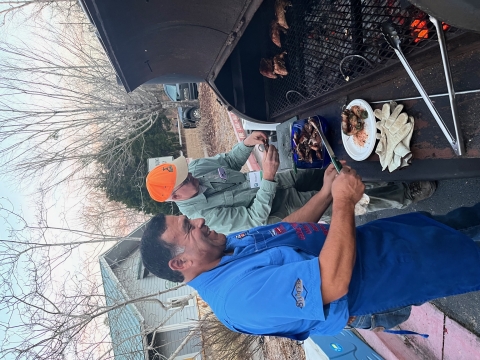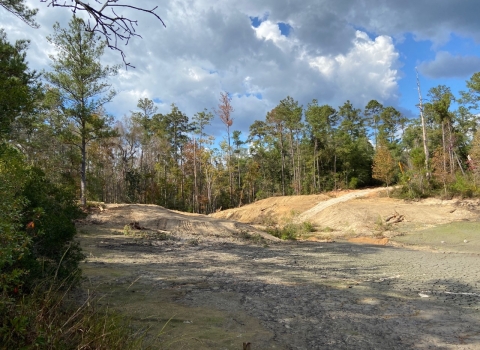I have always been the outdoorsy type. Whether it be hiking, mountain biking, kayaking or surfing, if it gets me closer to nature, I have probably tried it or plan to. I just can’t get enough of the outdoors. Despite that, there is one outdoor activity I could never have imagined pursuing — hunting.
I had little exposure to hunting growing up. My friends didn’t hunt, their parents didn’t hunt, and neither did mine. My mother did grow up in a small town in Minnesota and she would sometimes tell us stories about her dad and brothers hunting when she was a kid, but most of her stories focused on being afraid of the hanging deer carcasses in her garage. As an animal lover and vegetarian for much of my life, I was pretty sure I did not want to have deer carcasses hanging in my garage. Aside from her stories, my only exposure to hunting was what I saw on the television — men in camouflage holding big guns and dead animals. I couldn’t relate.
Little did I know, I’d eventually embrace hunters as my fellow conservationists.
After I joined the U.S. Fish and Wildlife Service, I was lucky to get nominated for the Conservation Leaders for Tomorrow workshop. Conservation Leaders for Tomorrow is a program designed to introduce natural resource professionals to hunting, angling and trapping so they can better interact with stakeholders and navigate management issues involving such uses. The week-long workshop is made up of classroom sessions, discussions, and hands-on activities, all culminating in an optional hunt. It seemed like the perfect opportunity to immerse myself in a world that was so critical to my work and yet I had no experience in.
I soon found myself flying across the country to the Charlie Elliot Wildlife Center in Mansfield, Georgia to learn about hunting.
I had the opportunity to connect with many of the instructors over dinner, coffee, and in between field activities over the course of the workshop. I enthusiastically shared stories about scuba diving and hiking. They enthusiastically shared stories about hunting.
During those conversations I was surprised by a lot of what I heard. I had always assumed hunters were strictly motivated by the harvest. I thought they did what they did to put a deer head on the wall or fill their freezer with meat. What I didn’t realize was there was so much more to it.
One of the instructors told me he hadn’t harvested a deer in 5 years and had no intention to ever again. Yet, he went out every year with the same group of friends as he had for the past 30 years to hunt. For him, hunting was about friendship.
“A lot of times you’ll go out there with your buddies and just end up having a good time in the woods” he said.
Another instructor told stories about elk hunting with his son. He reminisced on a time when they had hunted an elk together and what it was like to process the elk over the course of a night and backpack the meat over seven miles back to their car. You could see the pride in his eyes. He had raised his kids to be hunters and it was something they could always connect over. For him, hunting was about family.
For many of the instructors it seemed hunting was simply about connecting with nature and clearing their minds. They just loved being in the forest, in the quiet, and a part of the wildness. One instructor told me: “Sometimes it’s more about the walk. We call it mountain therapy.”
While each instructor had their own unique set of motivations for hunting, they all seemed to share one that I had never expected — dogs.
“People don’t realize that a lot of hunting is just about getting outside with your dogs and enjoying watching them work” one said.
Over the course of the week, I laughed as I listened to the instructors playfully argue over what type of dog was the best hunting dog. They each had their favorite breed and were prepared to tell you why their dog was the best. During our last activity of the workshop, the quail hunt, I got to experience watching a hunting dog work. Rhett, a German short-haired pointer, excitedly found quail after quail as he led us through the fields. It’s safe to say his smile was almost as big as all of ours were while watching him. As a dog mom of two lovely mutts, I could completely relate to this motivation. So much of my life is spent with my dogs, training them, connecting with them, and experiencing the joy of watching them interact with the outdoors.
The more stories we shared, the more I realized how much our lifestyles and values aligned. I was speaking with people who valued friendship, family, connecting to nature, and who seemed to love dogs as much as I did. The gap between how I viewed myself and how I viewed hunters had started to shrink. Then, I learned about the Pittman-Robertson Act.
In 1937, the Pittman-Robertson Act was passed. It put an excise tax on all firearms and ammunition sold in the United States and distributed the revenue to wildlife agencies to fund conservation. The funding from the act is critical to natural resource agencies ability to improve habitat and manage species across the U.S. I had never heard of this act before and could not believe I had hunters to thank for keeping so many of the places I love to hike, mountain bike and kayak in healthy.
Not only did hunters share so many of the motivations I had for getting outdoors, but they have been funding conservation, something I’ve devoted my career to, for the past 86 years. It made me want to go out and thank a hunter. It also made me want to find more ways to contribute to conservation in my own way, such as purchasing a Federal Duck Stamp, to help protect the places I recreated in.
Participating in Conservation Leaders for Tomorrow was an amazing experience. I left the workshop with new perspectives, new skillsets, new friends and a bag full of quail I was proud to go home and cook for my loved ones.
I don’t know if I’ll ever add hunting to the already long list of ways I choose to get outdoors, but I have a new respect and understanding for the hunting community. And, as I continue to work in conservation, I’m excited to work hand-in-hand with hunters to continue to protect the places that matter to us all.






